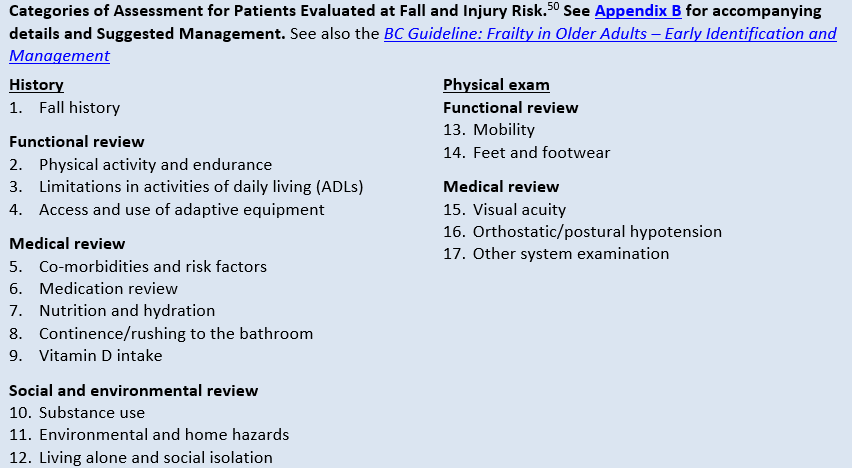The 2-Minute Rule for Dementia Fall Risk
The 2-Minute Rule for Dementia Fall Risk
Blog Article
The Dementia Fall Risk PDFs
Table of ContentsSome Known Details About Dementia Fall Risk Get This Report about Dementia Fall RiskGetting My Dementia Fall Risk To WorkNot known Details About Dementia Fall Risk
A fall danger evaluation checks to see how most likely it is that you will fall. The evaluation generally includes: This consists of a collection of concerns about your overall health and if you've had previous falls or troubles with equilibrium, standing, and/or walking.Treatments are recommendations that might lower your risk of dropping. STEADI consists of three steps: you for your risk of falling for your risk aspects that can be enhanced to attempt to prevent drops (for instance, equilibrium issues, impaired vision) to decrease your danger of dropping by making use of effective techniques (for instance, giving education and sources), you may be asked several questions consisting of: Have you dropped in the previous year? Are you fretted regarding dropping?
If it takes you 12 seconds or more, it might indicate you are at greater risk for an autumn. This examination checks strength and balance.
The positions will obtain more difficult as you go. Stand with your feet side-by-side. Relocate one foot midway forward, so the instep is touching the huge toe of your various other foot. Move one foot completely before the various other, so the toes are touching the heel of your various other foot.
Dementia Fall Risk - An Overview
Many drops take place as an outcome of multiple adding variables; as a result, handling the threat of falling begins with recognizing the variables that contribute to drop danger - Dementia Fall Risk. Some of one of the most relevant danger factors consist of: Background of previous fallsChronic clinical conditionsAcute illnessImpaired stride and balance, reduced extremity weaknessCognitive impairmentChanges in visionCertain risky medications and polypharmacyEnvironmental elements can additionally raise the risk for falls, consisting of: Insufficient lightingUneven or harmed flooringWet or slippery floorsMissing or damaged hand rails and get hold of barsDamaged or poorly fitted equipment, such as beds, mobility devices, or walkersImproper use of assistive devicesInadequate guidance of the people living in the NF, consisting of those who exhibit aggressive behaviorsA successful fall risk management program calls for a detailed professional assessment, with input from all members of the interdisciplinary team

The care plan should additionally include interventions that are system-based, such as those that advertise a safe atmosphere (suitable illumination, hand rails, get bars, and so on). The performance of the treatments should be evaluated regularly, and the treatment strategy revised as needed to reflect modifications in the loss threat assessment. Carrying out an autumn threat management system utilizing evidence-based best technique can reduce the occurrence of falls in the NF, while restricting the potential for fall-related injuries.
Some Known Factual Statements About Dementia Fall Risk
The AGS/BGS guideline recommends evaluating all grownups aged 65 years and older for autumn danger each year. This testing includes asking clients whether they have fallen 2 or more times in the previous year or sought clinical attention for a loss, or, if they have actually not fallen, whether they really feel unsteady when walking.
Individuals who have actually dropped once without injury should have their equilibrium and stride assessed; those with gait or balance irregularities must obtain extra analysis. A history of 1 fall without injury and without stride or balance troubles does not warrant more evaluation past continued yearly fall risk screening. Dementia Fall Risk. A loss risk evaluation is required as part of the Welcome to Medicare examination

How Dementia Fall Risk can Save You Time, Stress, and Money.
Recording a falls background is one of the top quality signs for loss prevention and monitoring. copyright medications in particular are independent predictors of drops.
Postural hypotension can commonly be minimized by lowering the dose of blood pressurelowering medicines and/or stopping drugs that have orthostatic hypotension as a side result. Use of above-the-knee support tube and resting with the head of the bed boosted might likewise decrease postural reductions in high blood pressure. The article suggested elements of a fall-focused checkup are displayed in Box 1.

A Yank time better than or equivalent to 12 secs suggests high loss danger. Being incapable to stand up from a chair of knee elevation without using one's arms shows raised autumn threat.
Report this page